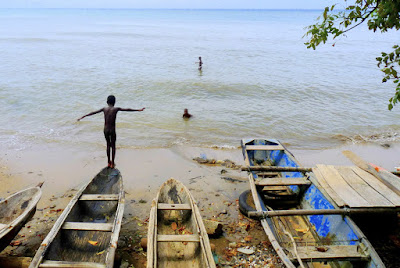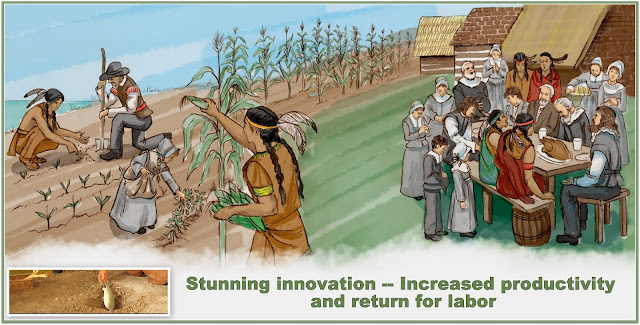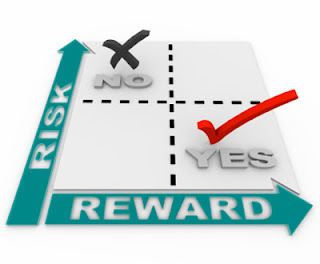When Squanto and Monte were discussing return on investment (ROI) in the corn industry, they came up with this
'fish & seed in the same hole' idea. It more than doubled the corn crop. Squanto and Monte patented the idea, formed a corporation for selling seeds and fish mush, and pretty much took all the profits from increased productivity for themselves. Everybody worked harder, and the fish smelled really bad, but MonteSquanto, Inc., got all the corn money (profits). Okay, no, not really, but if they had, they'd fit in perfectly with today's corporate business model.
That's the way it works these days. Increased productivity feeds the corporation, not the worker whose productivity it is in the first place. Some corporations are better than others in how employees are treated, but the rule of profit first is universal.
Worker productivity has more than doubled since the 1970's, but workforce wages are about the same today or perhaps a little less. All the increased productivity has benefited only management and the owners, the top 10% of wealth holders; i.e., all the gains went to the rich. Anything wrong with that?
Are employees just a resource to be used up and discarded? (Most major corporations are openly hostile to employees and consider the labor costs a liability to be aggressively minimized.)
Should employees be paid so little that other people have to feed them so they don't starve? (Walmart costs us about $6B/yr in financial assistance for low wage employees. We pay and Walmart owners pocket the benefit we provide.)
Is there a difference between a slave owner's ethical stance and our current profitability motive? Broken down to cost/benefit analysis and return on investment calculations, they're pretty much identical. Neither employees nor slaves are a corporate resource; they're people, and we're absolutely responsible for how they're treated.
Now let's consider this objectively, based on what we actually do as opposed to what we say ...
We're the wealthiest nation in the world,
but ...
Which countries have the lowest poverty rate?
- Taiwan has the lowest poverty rate worldwide – less than 2 percent of Taiwan's population lives in poverty...
followed by...
- Malaysia at 3.8 percent,
- Ireland at 5.5 percent,
- Austria at 6.2 percent, then
- Thailand and France at 7.8 percent, Switzerland at 7.9 percent,
- Canada at 9.4 percent,
- the Netherlands at 10.5 percent, and ...
- ... France, Switzerland, Kazakhstan, Greenland, Poland, Russia, ... and even China.
- the US ranks about 35th down the list.
And which industrialized countries have the highest child poverty rate?
A report released in 2012 by the United Nations Children's Fund (UNICEF) reveals alarming child poverty rates within affluent, or 'developed', nations.
- The US ranks second highest among all measured countries, with 23.1 per cent of children living in poverty, just under Romania's 25.6 per cent.
If we're the wealthiest nation in the world, why do we treat our children so poorly?
Where in all of this might we find Christian principles displayed?
The conflict, of course, is between our evolved culture (frog in a kettle) and our claimed values. The issues we can address are (1) our personal life and choices, and (2) our sphere of influence. We can teach our children that people are not resources to be used and discarded.
Interestingly, the issue of human rights is commonly thought to be some weirdo liberal agenda. Justice, equality, opportunity, etc. What are the answers a sincere Christian might require?



















